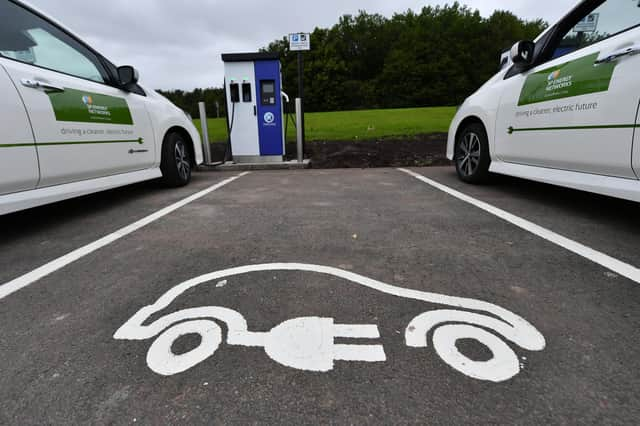West Lothian and Falkirk fail to keep pace with electric vehicle charging points roll-out


Thinktank the Policy Exchange says there are still charging "blackspots" in regions across the UK, adding the speed of installations needs to increase to meet growing demand.
There were 43 public charging points in Falkirk at the start of January, according to figures from the Department for Transport (DfT).
Advertisement
Hide AdAdvertisement
Hide AdThat is a rate of 27 per 100,000 people, lower than the UK average of 31.
Since October 2019 – when figures began at a local authority level – Falkirk has seen 20 devices added to its supply.
There were 44 public charging points in West Lothian in January, giving a rate of 24 per 100,000 people.
West Lothian has added 10 devices since October 2019.
Across the UK, an additional 5,700 devices were made available over the same period, taking the total number up to 20,800 at the start of this year.
Advertisement
Hide AdAdvertisement
Hide AdElectric cars have surged in popularity. There were 500 electric vehicles licensed to addresses in West Lothian at the end of September 2020, according to latest DfT data – up by 42 per cent from 353 in September 2019. And there were 409 electric vehicles licensed to addresses in the Falkirk Council area, up by 73 per cent from 237 in September 2019.
In a bid to further boost numbers, transport minister Grant Shapps announced an extra £20 million was to be made available for local authorities.
However, a report by the Policy Exchange says the speed of the rollout needs to increase from the current rate to meet the planned ban on new petrol and diesel cars in 2030. It also found a gap in coverage of the charging points across the UK, claiming the Government's funding scheme for local authorities had not been evenly distributed.
In a foreword to the report, Conservative MP Simon Clarke said: "Whereas a driver of a petrol car can travel confidently from Land's End to John O'Groats, knowing that they can refill the tank every few miles, that is not yet the case for electric vehicles.
Advertisement
Hide AdAdvertisement
Hide Ad"Some areas have naturally built up impressive coverage, such as central London, but vast swathes of the country have not."
He added: "As with the enduring problems of broadband rollout which leave blackspots even today, the market misses out large parts of the UK, especially smaller towns and rural areas."
The DfT acknowledged the "uneven" distribution of devices across the UK in a report accompanying the latest figures, which were produced from the platform Zap-Map covering per cent of publicly accessible charging-points.